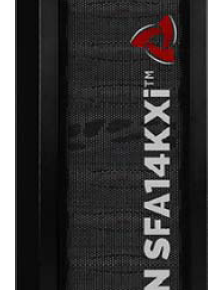DDN Flashes New All-flash Arrays for Enterprise Use Cases at Scale

DDN, a high-end storage standard bearer, this morning joined the ranks of storage vendors offering new all-flash technology with the launch of Flashscale, a family of all-flash, scale-out and scale-up products designed for read, write and mixed workloads for enterprise data analytics, web scale cloud and HPC environments.
Available in August, the SFA14KXi (the first model number within the Flashscale family) is targeted at organizations demanding storage platforms that deliver high performance capacity and latency across massive stores of data types and applications, including analytics and database acceleration in Hadoop environments in the financial services, life sciences, healthcare, manufacturing and energy sectors. Use cases include fraud detection, IOT / sensor data capture and analysis, and real-time data processing.
DDN said the availability of the all-flash array extends DDN’s end-to-end storage line, starting with tape and object-based storage through to the new flash technology, enabling customers to store and utilize data via the most cost-effective and performance-appropriate storage medium according to where it resides within the data life-cycle.
The Flashscale SFA14KXi includes a built-for-flash custom architecture that leverages each SSD in the solution, the company said, by aggregating the performance of each device and delivering the performance over the low latency embedded PCIe Gen3 fabric to high-demand applications. DDN’s internal PCIe Gen3 fabric delivers native performance and latencies down to 100μs from 48 NVMe or 72 SAS or any mix of SSDs while offering sub-$1/GB all-flash storage up to 576TB, 6 Million IOPS and 60GB/s per 4U node and 600 GB/s in a single rack.
Taken together, DDN said the SFA14KXi is ideal for analytics and file systems, SAS analytics, Hadoop, OpenStack and parallel file systems such as Lustre and IBM Spectrum Scale (GPFS).
DDN has talked extensively about its evolution from a pure-play HPC vendor (its equipment is used at two-thirds of the Top100 supercomputing sites) to one whose primary source of growth is in the enterprise. Today, the company says it is installed at 40 percent of the world’s largest investment banks, 30 percent of the world’s largest aerospace and automobile manufacturers, a third of the sequencing centers in the life sciences industry and more than 600 media companies.
DDN CEO Alex Bouzari said in an interview that the rounding out of the company’s product line to include all-flash reflects two important trends in the high-end enterprise storage market: an emphasis on solutions that include enterprise features, and the need for products that manage the complete data life cycle.
“HPC use cases are finding their way into the enterprise,” said Bouzari. “Although the requirements of the enterprise are large-scale – data management, data processing, the ability to layer analytics – in order to accelerate time-to-insight the attributes that are required in the portfolio are vastly different from HPC.” Critically important, he said, are application-ready solutions that are resilient, reliable and supported with domain-expertise and services.
He also said companies “are no longer interested in just point products, they’re looking for organization that can come in and help them make sense of the end-to-end data cycle management, make my (the user’s) workflows more efficient, give the ability to accelerate the basket of applications I’m using so I can be more competitive,” and rationalize the potpourri of software defined infrastructure, the tidal wave of open source applications and the need for workflow acceleration.
Bouzari said DDN has customers in the web cloud space doing truly massive scale implementation – one uses DDN object-based technology to store half a trillion objects. “When you look at the spend of an AWS, these guys spend per month more than the exascale machine that the government labs are trying to put together in a 10-year program. AWS is spending that in a month and it doesn’t take them 10 years to figure out what the machine should be.”
Randy Kerns, a senior strategist and analyst at industry analyst firm Evaluator Group, agreed.
“The dramatic increase of data growth for enterprise organizations, coupled with the fact that these organizations are increasingly looking to optimize IT solutions to deliver business competitive advantage, is driving the need for massive-scale storage solutions,” Kerns said. “These systems must deliver performance exceeding traditional solutions to accelerate time-to-results, data analytics, and business insights and with greatly improved economics. DDN’s new Flashscale all-flash systems deliver these performance and economic advantages for enterprise organizations, addressing the next-generation use case requirements for data-intensive custom applications and multi-step workflows. With the extreme performance and bandwidth in a 4U footprint, DDN has delivered Flashscale as an impressive solution for performance-intensive workloads and large scale data analytics.”
Flashscale will utilize Intel’s new “Broadwell” Xeon processor announced last month, with Flashscale’s estimated ship date tied to full Broadwell integration and testing. Combined with the PCI-e fabric, the system will run on Intel’s OmniPath architecture, a central component of Intel’s Scalable System Framework.
Molly Rector, DDN’s CMO, EVP Product Management and Worldwide Marketing, said Flashscale’s performance will reduce customers’ software licensing costs by as much as 75 percent.












